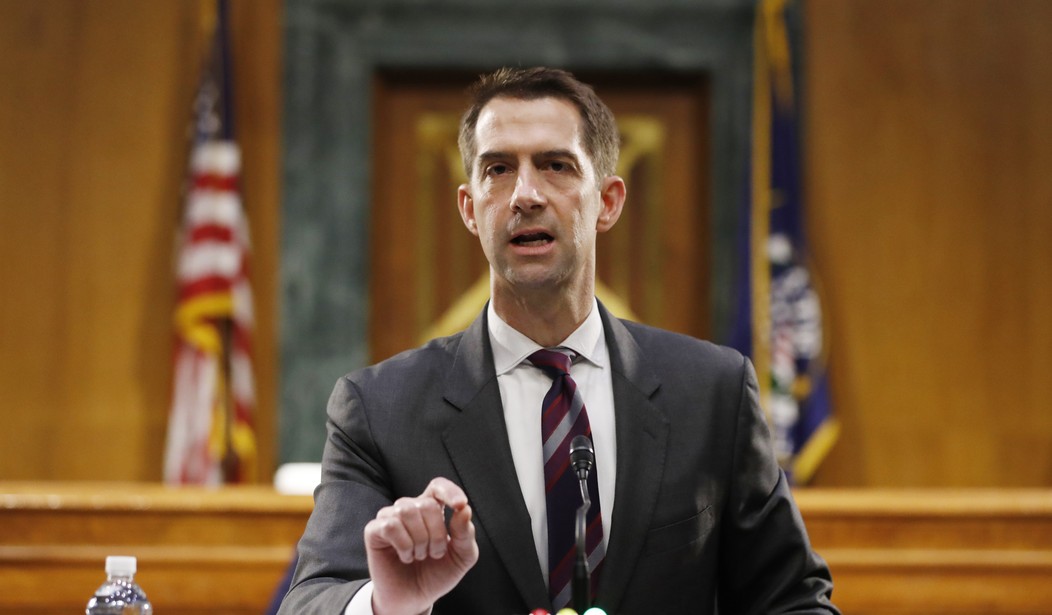When the House of Representatives voted to impeach President Donald Trump a second time on Wednesday, Senate Majority Leader Mitch McConnell (R-Ky.) had already announced that the Senate would not reconvene until January 19, one day before Joe Biden’s inauguration on January 20. This means that the process of impeachment would be guaranteed to continue after Trump had left office.
Procedurally, there is no reason why the Senate could not hold an impeachment trial to convict or acquit Donald Trump after he ceases to be president. However, Sen. Tom Cotton (R-Ark.) insisted that such a post-presidential impeachment would violate the Constitution.
Cotton began his remarks by championing the rule of law and vocally condemning the horrific violent attack on the U.S. Capitol last week that followed a pro-Trump rally where the president spoke.
Cotton quoted Abraham Lincoln, who said, “There is no grievance that is a fit object of redress by mob law.”
“As I said last summer when mob violence gripped our streets, so I say again about the mob violence at our nation’s Capitol last week: those persons responsible should be held accountable in the courts to the full extent of the law,” the senator began.
He suggested that a Senate impeachment trial for Trump after January 20 would involve similar lawlessness.
“The House has passed an article of impeachment against the president, but the Senate under its rules and precedents cannot start and conclude a fair trial before the president leaves office next week. Under these circumstances, the Senate lacks constitutional authority to conduct impeachment proceedings against a former president,” Cotton argued.
“The Founders designed the impeachment process as a way to remove officeholders from public office—not an inquest against private citizens. The Constitution presupposes an office from which an impeached officeholder can be removed,” the senator insisted.
“Fidelity to the Constitution must always remain the lodestar for our nation. Last week, I opposed the effort to reject certified electoral votes for the same reason—fidelity to the Constitution—I now oppose impeachment proceedings against a former president,” Cotton declared.
He called on Congress and the executive branch to “concentrate entirely for the next week on conducting a safe and orderly transfer of power.”
After Biden’s inauguration, Cotton argued, the Senate should not take up the article of impeachment. “After January 20, Congress should get on with the people’s business: improving our vaccination efforts, getting kids back to school, and getting workers back on the job.”
Cotton makes a strong argument. The key focus of impeachment is removal from office. However, the Constitution also suggests that impeachment can include “disqualification to hold and enjoy any Office of honor, Trust or Profit under the United States.”
This potential punishment suggests that impeachment could be used in the way Democrats like House Speaker Nancy Pelosi (D-Calif.) aim to use it in this case: to prevent Trump from ever holding office again.
While Cotton raised an interesting constitutional question, Senate Majority Leader Mitch McConnell (R-Ky.) announced that the Senate will take up the impeachment when it reconvenes. It remains to be seen how the Senate will act under the incoming Democratic majority, but the Democrats are not less likely to take up Trump’s impeachment.
The Constitution mentions impeachment three times:
Article 1 Section 2 The House of Representatives shall chuse their Speaker and other Officers; and shall have the sole Power of Impeachment.
Article 1 Section 3 Judgment in Cases of Impeachment shall not extend further than to removal from Office, and disqualification to hold and enjoy any Office of honor, Trust or Profit under the United States: but the Party convicted shall nevertheless be liable and subject to Indictment, Trial, Judgment and Punishment, according to Law.
Article 2 Section 4 The President, Vice President and all civil Officers of the United States, shall be removed from Office on Impeachment for, and Conviction of, Treason, Bribery, or other high Crimes and Misdemeanors.
Tyler O’Neil is the author of Making Hate Pay: The Corruption of the Southern Poverty Law Center. Follow him on Twitter at @Tyler2ONeil.









Join the conversation as a VIP Member